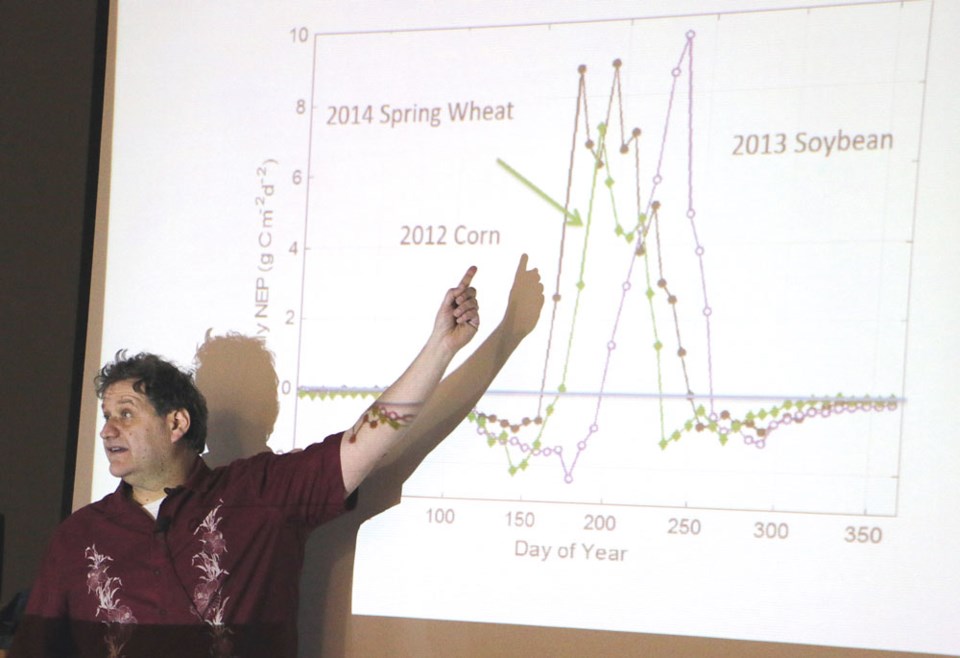The annual Moose Mountain Ag Day in Arcola offered a lot of information for the producers who braved challenging road conditions to attend the event.
The March 8 conference at Prairie Place Hall in Arcola took place the day after a two-day blizzard that made many roads in southeast Saskatchewan impassible. Four of the five scheduled speakers were able to make it to the event, but only about 27 people were in the audience.
“For better or worse, we knew that the Wednesday itself (March 8) was going to be a good day, but I think we underestimated the impact of the storm,” said Lorne Klein, who chaired the event’s committee. “Certainly people had to get themselves dug out on Wednesday morning.”
Organizers had planned to have around 125 people in the hall that day to listen to the speakers.
They also had 14 booths signed up for a trade show, but only two of them were able to make it.
The opening speaker was Mario Tenuta, a professor of applied soil ecology at the University of Manitoba. Tenuta discussed carbon sequestration in agricultural soils and the practices that farmers can have to sequester carbon.
“There’s so much talk about carbon sequestration these days, with the federal government and carbon taxing,” said Klein.
Producers can employ such tactics as continuous cropping and leaving the crop residue on the land, which Klein said is already common in farming. They can also reduce tillage, seed land to perennial forage and then have it grazed properly, and employ what he called cocktail cover crops.
“It’s a culmination of many species of plants that you seed on a field, and because of the multiple species, there are plants that are growing for more days in the summer,” said Klein.
“For example, when you have a crop of canola, and you get it harvested early, then you have all the rest of the fall where nothing is growing. There’s now evidence to suggest that you have another crop in the canopy that will continue growing after the first crop is harvested. That’s beneficial for carbon sequestration.”
David Pattyson, the executive director for the Upper Souris Watershed Association, talked about different projects the association is doing with landowners.
One of them is the seeding of erodible and saline sales in perennial vegetation, and another is re-establishing wetlands with landowners.
“Wetlands that were previously drained, they will put in ditch plugs and re-establish them,” said Klein.
Pattyson also gave an overview of the Gooseberry Lake Drainage Project that the provincial government completed last fall northwest of Stoughton. Klein said Landowners have installed flow controls to limit the runoff of water.
Colin Rosengren from the Three Farmers business delivered a couple of presentations. One was on the experiences the Three Farmers have had while taking products right from the field to the consumer’s plate with their camelina oil and chickpeas.
“He had an interesting story to tell about all the challenges involved with doing that sort of an enterprise,” said Klein.
Rosengren’s other presentation was on crop combinations. He grows two or three separate cash crops together on the same field in the same year.
“That was a very interesting presentation of all the things that he has experimented with over the years, the different culminations he has come up with, and how he manages the agronomics of all that,” said Klein.
Rosengren also explained how handles the seed separation of those multi-species crops.
Ann Wasko, a market analyst for gateway livestock, was the other speaker.
“Any time you listen to a presentation about what the future of the market is going to be … there are many, many moving parts out there that determine where the grain and livestock markets will eventually land,” said Klein.
Those factors include supply and demand and global politics. It can get clouded and complicated, Klein said.
The lone speaker who didn’t make the event was Ryan Boyd from SG&R Farms in Forrest, Manitoba, who was scheduled to talk about the integration of crops and livestock.




